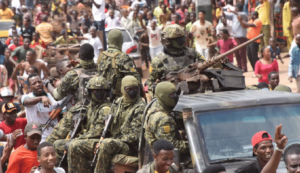The Coalition of United Political Parties (CUPP) has warned President Bola Tinubu-led Federal Government against invading Niger Republic in a bid to restore ousted President Mohamed Bazoum to power.

Goldennewsng recalls that on July 25, General Abdourahamane Tchiani-led Presidential Guard had detained and taken over power from Bazoum.
Following the coup, the Economic Community of West African States (ECOWAS) imposed sanctions on Niger Republic while also threatening military intervention.
Tinubu, in a letter to the Senate on Friday, briefed the National Assembly on the proposed military invasion of the West African country and other penalties against the coup plotters in the Niger Republic.
But in a statement on Friday, the co-National Spokesperson of CUPP, Mark Adebayo, said the planned military intervention is unnecessary and absolutely thoughtless.
The CUPP said the reason for opposing the proposed military action is because the Nigerian military has been overstretched over the years battling terrorism and insurgency and draining the country’s resources.
It said the proposed military intervention is neither a war that Nigeria can afford nor win, especially in the face of the overwhelming popularity of the coup among the generality of Nigeriens.
He said, “It has come to our notice the preparations by Nigeria and some other West African countries for a military intervention in Niger Republic ostensibly to reinstate the overthrown civilian government in the country. First, Nigeria, in its current socioeconomic state, cannot afford such a costly intervention. The Nigerian military has been overstretched over the years battling terrorism and all manners of insurgency that are still very active and draining the country’s resources to the tune of billions of Naira weekly.
“It is not only unnecessary but absolutely thoughtless for Nigeria to contemplate intervening militarily in the internal affairs of another country when the security situation in our own country remains a serious challenge to our military and other security agencies with an economy that is currently sick.
“It is neither a war that Nigeria can afford nor win, especially in the face of the overwhelming popularity of the coup among the generality of Nigeriens. Any military intervention without the support of the people of Niger is dead on arrival, and it is glaring that the coup that toppled President Mohammed Bazoum was a widely popular one.
Therefore, Nigeria cannot afford to waste its dwindling resources and the precious lives of our soldiers fighting an unnecessary war that it can ill afford. The sick cannot treat the sick. Nigeria should rather concentrate on healing itself instead of looking for trouble in another country
“We support any diplomatic efforts by the West African subregion to resolve the Nigerien impasse. But military intervention is taking the matter too far, and we daresay it would fail catastrophically. Whatever resources are being put together to fight in another man’s country should be put to better use for Nigeria and alleviate the suffering of the people under this unfriendly economy rather than be frittered away in a war that doesn’t really concern us when we have our own wars internally that we haven’t overcome.
“Nigeria and other West African countries desirous of reinstating democracy in Niger Republic should rather deploy their diplomatic assets with possible collaboration of the international community to amicably resolve the situation in Niger Republic without military action and without a single drop of blood.
“President Bola Tinubu should avoid plunging Nigeria’s fragile economy into more depression by intervening militarily in another country. Even if diplomatic channels have been exhausted, Nigeriens should be allowed to run their country as they deem fit, even though we support the survival of democracy based on good governance in Africa.
“You can’t force people against their own will to do what they don’t consider is in their best interests. Nigeria should leave Niger alone to determine its own present and future. Whatever interventions are being contemplated should remain within the purview of diplomacy – no more, no less.”


















